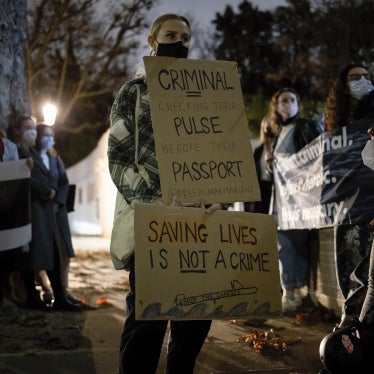Attacks and harassment against journalists in parts of Ukraine appear aimed at stifling public debate during the country’s political crisis, Human Rights Watch said today. Ukrainian authorities must respect press freedom to ensure the integrity of the new presidential election.
“These attempts at censorship and intimidation aim to prevent people from receiving information and expressing diverse views,” said Rachel Denber, acting executive director of Human Rights Watch’s Europe and Central Asia Division. “Free and fair elections depend on an informed electorate.”
Ukraine has been locked in a political crisis since the November 21 presidential run-off election, which monitoring groups found to be marred by widespread fraud. According to official results released by the government, Prime Minister Viktor Yanukovich defeated Viktor Yushchenko, the opposition candidate. Hundreds of thousands of protesters have occupied the streets of the capital Kyiv in protest. On Friday the Ukrainian Supreme Court ruled that a new election must be held by December 26.
Since the November 21 election, there has been a pattern of violent attacks and administrative harassment of journalists in Ukraine, Human Rights Watch said. Most incidents, reported by international organizations and the Ukrainian and international media, have occurred in Lugansk and Donetsk, two of the eastern cities of the country that have primarily supported the pro-government candidate Yanukovich. Incidents have also been reported in other eastern regions, including Dnepopetrovsk, Kirovograd, Sumy, and Kharkiv. Meanwhile, several minor incidents were reported in Kyiv.
In the city of Lugansk, two journalists attempting to cover a rally for opposition candidate Yushchekno were beaten up on November 29 and their recording equipment was stolen when a large group of unidentified men arrived at the rally and began to beat demonstrators and observers. Evgenny Sovchenko, a correspondent for the local Lugansk paper, Luganchane, as well as for the national paper Vechernie Vesti was beaten when he tried to prevent the assailants from stealing another observer’s video camera. Four men punched Sovchenko until he fell to the ground, and then continued to kick him. Sovchenko remains hospitalized due to his injuries.
Anna Niskadubova, a correspondent for the Ukrainian News Agency, was beaten when she tried to telephone for help for Sovchenko. One man ripped the phone from her hand, while another pulled her backwards by the hair. The men continued kicking her, leaving her with bruises on her legs. Both Sovchenko and Niskadubova told Human Rights Watch that about 30 police officers who had been observing the demonstration were in the immediate vicinity during the attack, but refused to intervene when demonstrators and observers called for help.
In Lugansk region local authorities attempted to block the broadcast of two independent television channels. On November 24, the Lugansk Regional Council adopted a decision to forbid a state-controlled cable company in the region from broadcasting TV Era and Channel 5. TV Era filed suit, and a Kyiv court issued a stay of implementation of the decision. Both stations remain on the air. According to press reports, authorities in Donetsk and Kharkiv also interfered with the broadcasting of ERA TV and Channel 5.
“The Ukrainian government has a poor track record on press freedoms,” said Denber. “It must take steps now to ensure a free environment for media outlets reporting on political developments in Ukraine.”
Despite informal censorship, the media in Ukraine remains diverse. Since the November 21 run-off election, several anchors on state-dominated national television stations have either refused to go on the air or toe the government line about the elections and the political crisis in their news broadcasts.
Background on press freedom in Ukraine
A 2003 Human Rights Watch report, “Negotiating the News,” documented the Ukrainian government’s pattern of informal censorship. The government or individuals close to the president own most major media outlets, including almost all television stations. The government blatantly uses its sway over these media to influence their coverage of the news, in part by issuing instructions to news editors, sometimes in writing, detailing what news stories should be covered, and how. As a result, the government receives a disproportionate positive coverage in most media, while opposition parties and figures have struggled to get their voices heard.
Under international pressure, the government has taken some steps to address problems of press freedom—most notably by adopting a law defining censorship and criminalizing government interference with the press. But the government’s continued manipulation of the media shows that press freedom is by no means fully respected.







